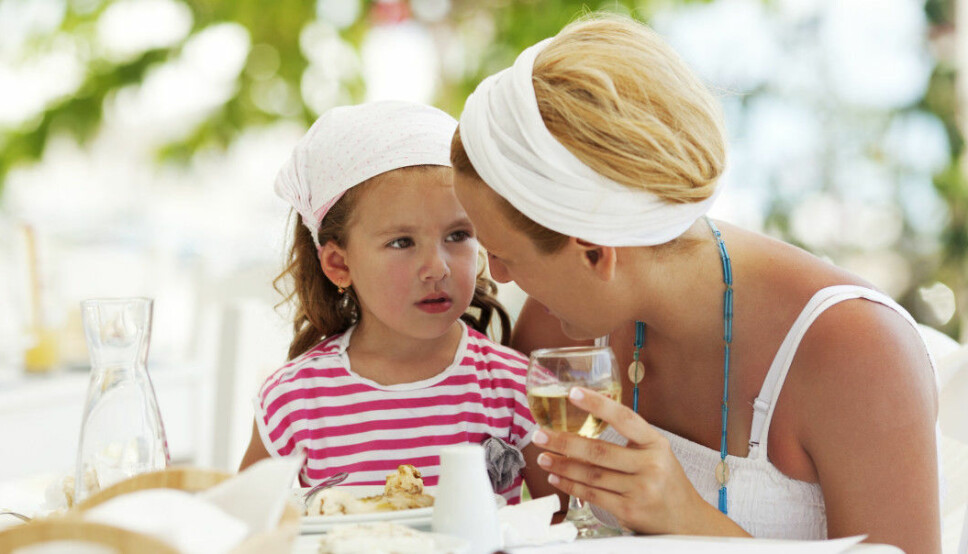
Mum drinking just a little too much led to behavioural problems in children
This doesn’t only apply to mothers with alcohol abuse issues. A Norwegian study shows that merely a slightly elevated alcohol consumption in mothers of toddlers can lead to more behavioural problems in children.
We’ve heard a lot about the harmful effects of consuming alcohol during pregnancy.
But the effect of alcohol on the child doesn’t stop once the baby is born. Previous research has shown that mum's drinking habits can affect children growing up.
Maternal at-risk drinking is linked to emotional problems like anxiety, depression, worry and uncertainty. Alcohol use also seems to be associated with child behavioural problems, such as aggressiveness, restlessness and concentration difficulties.
But a lot of uncertainty still exists around these connections.
For example, what level of alcohol use must be reached before children develop problems? And how much of the connection is actually due to alcohol?
It is well known that genetics are closely related to both alcohol use and mental health problems. In addition, parents who drink a lot may also typically have other characteristics that affect their living situations. Maybe these children would have had similar problems, even if the mothers had abstained from drinking?
A new Norwegian study has tried to learn more about these relationships.
34 000 children
“This study captures regular Norwegian drinking,” says senior researcher Ingunn Olea Lund at the Norwegian Institute of Public Health.
She and her colleagues have used data from 34 000 children in the Norwegian Mother, Father and Child Cohort Study. The cohort study provides detailed information about parents and extended family members, and how children fared from birth to age 5.
The study included many siblings, making it possible to compare siblings who grew up when mum drank quite a lot with siblings who grew up during a period when she drank less. It was also possible to compare cousins, such as the children of a sister who drank a lot and the children of a sister who did not drink much.
In this way, the researchers were able to distinguish the effect of the alcohol itself from the effect of genetics.
Effects of three to four units on a weekday
The results showed that alcohol had little effect on the risk for emotional problems in children.
When it came to behavioural issues, however, the case was different.
Children who grew up with mothers who drank quite a lot had a significantly greater risk of developing behavioural problems.
“This didn’t apply only to mothers who drank at a level that could indicate they had an alcohol abuse disorder,” Lund said.
“We saw an increase in risk even with mothers who drank three to four alcohol units on a weekday, or five to six units on a weekend. It’s not uncommon for adults to drink at that level in Norway,” says Lund.
Primarily genetics but also clear alcohol effect
The analyses showed that most of this effect appeared to be due to genetics and other environmental factors in the family. However, a minor part of the risk was related specifically to the use of alcohol.
“Given these results, we can now say with greater certainty that alcohol plays a role,” says Lund. She is not surprised that the effect was noticeable even at such a low level of alcohol consumption.
A previous study on teenagers by Lund and her colleagues showed similar results.
“In some families, moderate drinking might be OK, but in families with multiple risk factors, even moderate parental drinking could contribute to an increased risk of mental health issues in adolescents over time,” she said.
Should perhaps limit themselves
"Although the effect of drinking itself is may mean less than the effect of genetic and other factors, the alcohol effect is still important,” says Lund.
Unlike many factors, it’s possible to do something about the alcohol effect. It’s important for mothers to know that even alcohol use that is considered normal can have a negative impact on the child.
“It’s quite natural to think that after pregnancy you can go back to the alcohol habits you had before. But maybe you should reduce your intake somewhat instead,” Lund says.
However, she says there is still a lot we don’t know about the association between maternal drinking and problems in children.
For example, the survey says nothing about how the impact occurred. Were the children present when Mum was drinking and experienced uncertainty because her behavior changed? Or was Mum just more tired and had less energy for the kids after a night out on the town?
Nor do the data say anything about how the father's drinking habits figure in.
Women drink more
Eli Marie Wiig is a senior adviser at the KoRus Sør drug and alcohol competence centre. She is also researching toddlers of addicted mothers.
Wiig believes the new study is important and exciting.
“Documenting conditions in Norway through such a comprehensive study is important,” she says.
Wiig thinks it's interesting that the study examines normal drinking, not just mothers with addiction.
“The HUNT study shows that alcohol consumption among women has been increasing from generation to generation. This means that children today are exposed to more maternal drinking than before. Is this having consequences?” she wonders.
Wiig is not too surprised that even drinking habits in the normal range could actually have an adverse impact on child behaviour.
She says the study findings align with the stories that children and adult children tell. They relate how they were uncomfortable when the adults drank. It can feel unsafe, even if the parents themselves just feel relaxed and in a good mood.
Facts need to come to light
Wiig believes it is important for the information from the new study to be made available. Especially the understanding of how big a role genetics play could help to remove the stigma surrounding alcohol and behaviour problems.
In the past, people thought that the environment was mostly to blame – that poor parents transmitted substance use and problems to the next generation. But the research is showing that genes determine a lot.
At the same time, it is important for people to know that drinking habits also play a role, and that a drinking pattern within the norm can still be unhealthy for children.
Wiig emphasizes that this should not be moral finger pointing or teetotalism for parents of toddlers.
“What’s most important is to come out with the facts, and then people can make informed choices themselves,” she says.
Translated by: Ingrid P. Nuse
Reference:
I.O. Lund et.al: «Maternal Drinking and Child Emotional and Behavior Problems», Pediatrics, March 2020. Abstract.
———

































